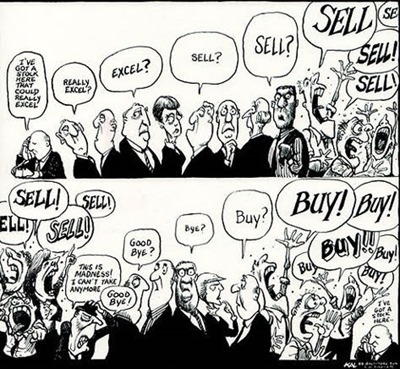The thing that struck me the most about yesterday’s global market selloff, is the sense of déjà vu. The more things change, the more they stay the same:
Tuesday, August 25, 2015
Thursday, August 13, 2015
What To Do About The Ringgit
My advice to BNM and the government, not that they need it, would essentially be the following:
Wednesday, August 12, 2015
Monetary Policy and the Yuan
In a shock move yesterday, the PBOC announced a sharp downward revision in the Yuan’s reference rate, with another one coming today. This de facto devaluation has had repercussions across the world, with some speculating that it would even put the Fed off from raising interest rates in September. It’s certainly the catalyst for the Ringgit moving past RM4.00 to the USD this morning.
There’s all kinds of speculation as to why (the devaluation I mean). Off hand, I would say the notion of currency war and regaining trade competitiveness is grossly mistaken. With regionally distributed production chains, the impact of FX changes on competitiveness have gradually been disappearing.
Friedman On Pegging
I’ve got the book*, but I’m too lazy to type it all out, so I’m quoting Friedman’s thoughts on this from my friend Lar’s post (excerpt):
Milton Friedman on exchange rates #4
...Despite Milton Friedman typically – and rightly – being labelled as the standard bearer for floating exchange rates, he often stresses that the choice is not easy, and he has repeatedly emphasised that countries have achieved both good and bad results with fixed and floating exchange rates. He points out for example that in 1985 Israel successfully implemented a fixed exchange rate policy against the dollar that helped cut inflation without causing any negative long-term economic repercussions.
Ringgit Fallacies: Imported Inflation and International Reserves
Another week, another multi-year low for the Ringgit. Since BNM appears to have stopped intervening, the Ringgit has continued to weaken against the USD, to what appears to be everyone’s consternation. There is this feeling that BNM should do something, anything, to halt the slide – cue: rumours over another Ringgit peg and capital controls.
To me, this is all a bit silly. Why should BNM lift a finger? Both economic theory and the empirical evidence is very clear – in the wake of a terms of trade shock, the real exchange rate should depreciate, even if it overshoots. NOT doing so would create a situation where the currency would be fundamentally overvalued, and we would therefore be risking another 1997-98 style crisis. Note the direction of causality here – it isn’t the weakening of the exchange rate that gave rise to the crisis, but rather the avoidance of the adjustment.
Pegging the currency under these circumstances would be spectacularly stupid. I’ll have more to say about this in my next post.
Monday, August 10, 2015
Poverty, Corruption and Economic Growth
One of the puzzling things I’ve found in the empirical data is that corruption doesn’t seem to have any impact on economic growth (I found instead that corruption primarily impacts the variance of growth, but not growth itself or the level of development). It appears to matter what type of corruption is involved, and the institutional framework that a country has.
Here’s Ricardo Hausmann on the same subject (exceprt):
Fighting Corruption Won’t End Poverty
CAMBRIDGE – Countries are poor because governments are corrupt. And, unless they ensure that public resources are not stolen, and that public power is not used for private gain, they will remain poor, right?
It certainly is tempting to believe so. Here, after all, is a narrative that neatly aligns the promise of prosperity with the struggle against injustice. As Pope Francis said on his recent trip to Latin America: “corruption is the moth, the gangrene of a people.” The corrupt deserve to be “tied to a rock and cast into the sea.”
Perhaps they do. But that won’t necessarily make their countries more prosperous.
Friday, August 7, 2015
Inequality: The Important Role of Family and Inheritance
From the NBER (abstract):
Poor Little Rich Kids? The Determinants of the Intergenerational Transmission of Wealth
Sandra E. Black, Paul J. Devereux, Petter Lundborg, Kaveh MajlesiWealth is highly correlated between parents and their children; however, little is known about the extent to which these relationships are genetic or determined by environmental factors. We use administrative data on the net wealth of a large sample of Swedish adoptees merged with similar information for their biological and adoptive parents. Comparing the relationship between the wealth of adopted and biological parents and that of the adopted child, we find that, even prior to any inheritance, there is a substantial role for environment and a much smaller role for genetics. We also examine the role played by bequests and find that, when they are taken into account, the role of adoptive parental wealth becomes much stronger. Our findings suggest that wealth transmission is not primarily because children from wealthier families are inherently more talented or more able but that, even in relatively egalitarian Sweden, wealth begets wealth.
Translation: It's nurture, not nature. If that's the case, meritocracy (in an aggregate sense) without some government intervention would be a sub-optimal growth and development strategy, even in a relatively equal society.
Technical Notes
Black, Sandra E., and Paul J. Devereux, Petter Lundborg, & Kaveh Majlesi, "Poor Little Rich Kids? The Determinants of the Intergenerational Transmission of Wealth", NBER Working Paper No. 21409, July 2015




